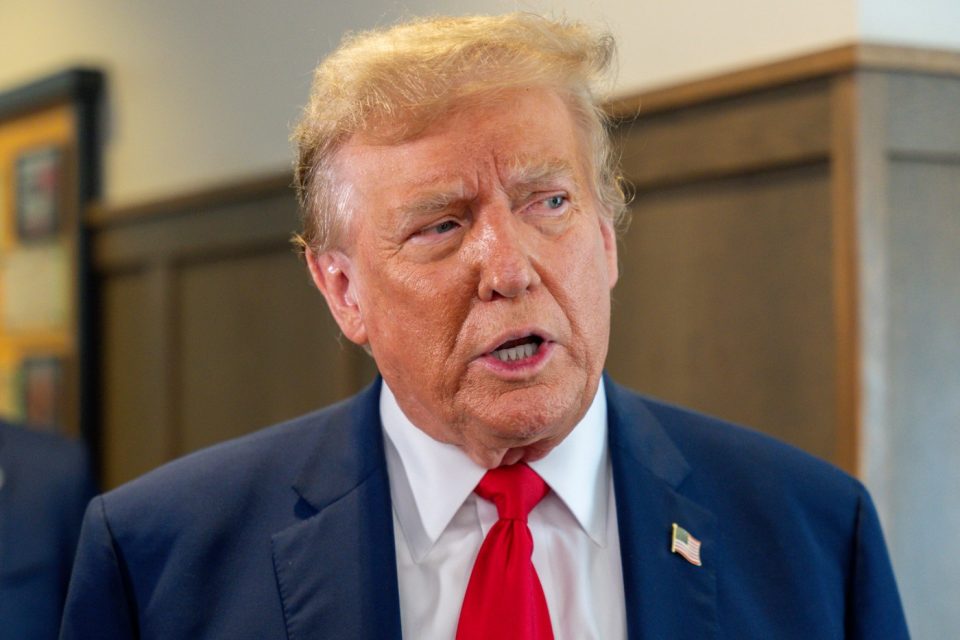
In Manhattan on Monday, jury selection begins in a case whose historical significance is impossible to overstate — the first time a former president or a presumed party nominee for president has ever been tried for crimes. Donald Trump stands accused of 34 felony counts of falsifying business records to cover up a scandal in the weeks before his 2016 election.
Trump’s brand is hiding information to influence elections. That’s election interference, plain and simple.
We see the current version today. This time, Trump is hiding the truth by manipulating the justice system to “delay, delay, delay” as many of his criminal trials as he can.
In one clear sense, it’s déjà vu all over again — Trump is again striving mightily to suppress information that voters need to make an informed choice about who will be our next president. In 2024, he wants to keep us from knowing whether he’s innocent or guilty of the crimes he’s been indicted for by four grand juries in four jurisdictions on four separate sets of crimes.
You wouldn’t buy a car without the facts about how it runs. If the manufacturer hides information from the market about the reliability and safety of its vehicles, we call it “consumer fraud.”
It’s no different when the “product” being considered is which presidential candidate to choose. We want to make important decisions based on full information.
Hiding it has been Trump’s M.O. in his businesses for decades. Take the $454 million verdict in his civil fraud trial for systematically failing for years to tell lenders and insurance companies the real value of his properties. Then there’s his 2018 $25 million settlement to compensate victims of his Trump University fraud.
Operating your businesses through concealment of the truth is habit-forming for those without regard for the welfare of consumers. No surprise that for Trump, the habit transferred easily to elections.
In October 2016, the suppressed information was buying the silence of porn star Stormy Daniels with whom he’d had a tryst while married. Through his “fixer,” attorney Michael Cohen, Trump paid off Daniels mere weeks before the election . . . and, according to prosecutors, immediately after another major scandal, the “Access Hollywood” tapes where he bragged of being able to grab women “by the p—y.”
Back-to-back scandals could easily have cost him the 80,000 votes that would have changed the election outcome. That would have kept our constitutional republic on course.
Technically, the 34 crimes included in the New York indictment relate to his alleged actions to keep the cover up covered up. According to the indictment’s statement of facts, in 2017, Trump falsely characterized as “legal fees” in business records his reimbursements to Cohen for his pre-election payments to Daniels.
Manhattan DA Alvin Bragg put it perfectly in a December interview on New York Public Radio. The core of the case, he said, “is not money for sex. . . . [I]t’s about conspiring to corrupt a presidential election and then lying in New York business records to cover it up.”
Accounts become due, even if years later. We’re on track now to know what a jury decides about whether he committed crimes in interfering with the 2016 election.
Let’s pause to appreciate something basic about the rule of law in America: The claims that Trump is innocent or guilty are best resolved in courts where evidence and facts prevail.
We can be grateful that the administration of justice remains fully operative in Manhattan. Americans can know truths that are relevant as we cast our 2024 ballots.
It’s easy to miss that basic reality, especially Trump tries to skirt accountability for alleged lawbreaking by exploiting legal procedures. The veteran columnist Juan Williams recently reflected on Trump leveraging the system for delay: “It is impossible to avoid the conclusion that our institutions are failing to hold Trump accountable, transforming him into a man operating outside of democratic norms.”
Understandable, for sure. But the New York trial — assuming it continues to proceed toward a timely verdict — stands as a stark rebuttal.
Like all defendants, Trump is innocent until proven guilty. And course, the facts underlying the Manhattan prosecution for 2016 election interference are four years older than those of the Jan. 6-related criminal cases against Trump and may seem less egregious. Even so, it remains hugely significant for the rule of law’s first principle — no one is above the law.
Importantly, this case stands out because, as the one first indicted, it’s first in line for trial and has the best chance of getting to a judgment before the election. Polls consistently show that voters care whether Trump is convicted.
To be sure, he tried to stall the Manhattan case, too. But given the indictment’s head start and a vigilant judge, it’s ready to go so that voters get what we need to know.
That matters to our democracy.
Aftergut, a former federal prosecutor, is of counsel to Lawyers Defending American Democracy.
